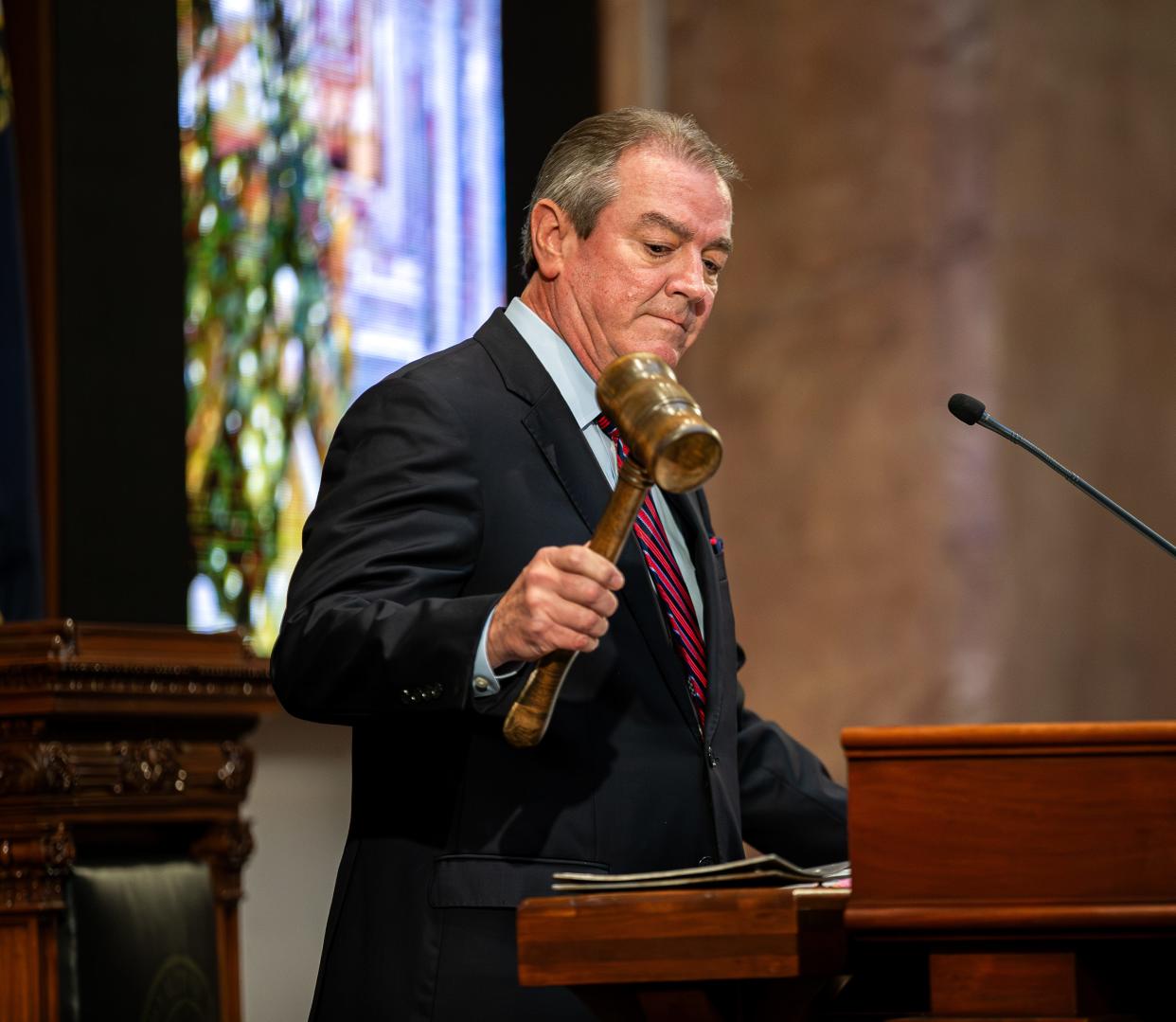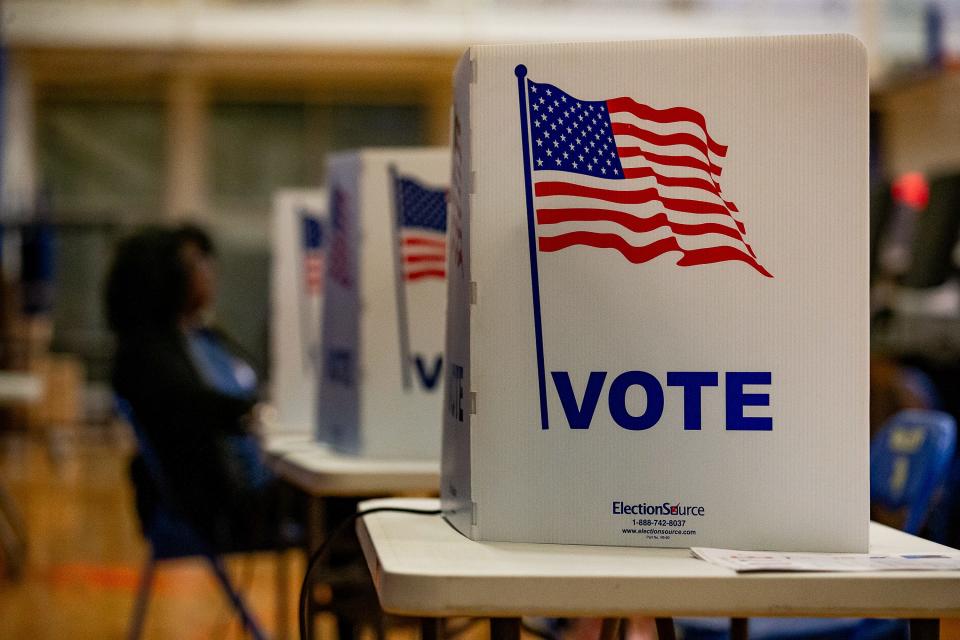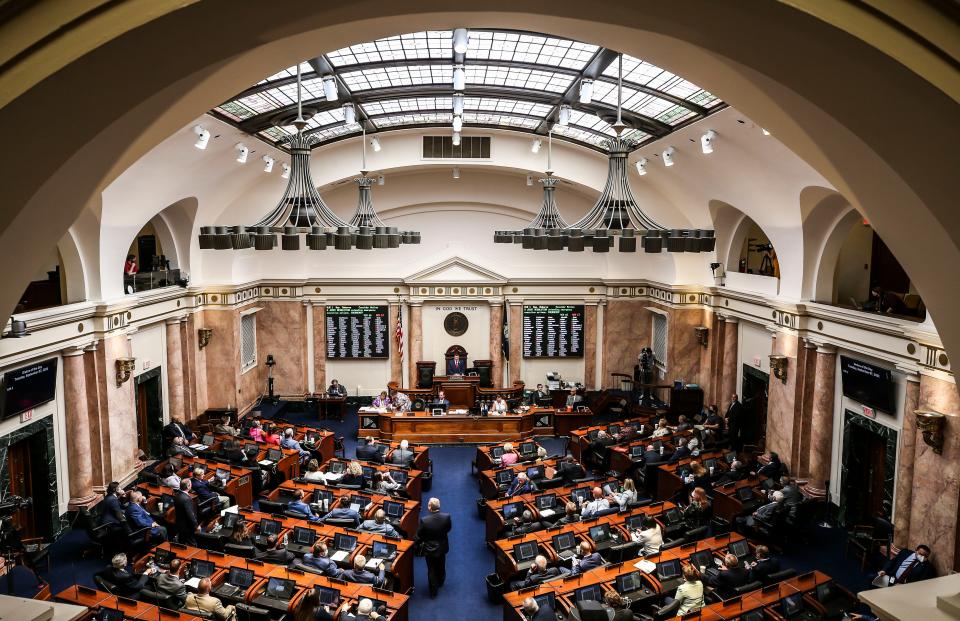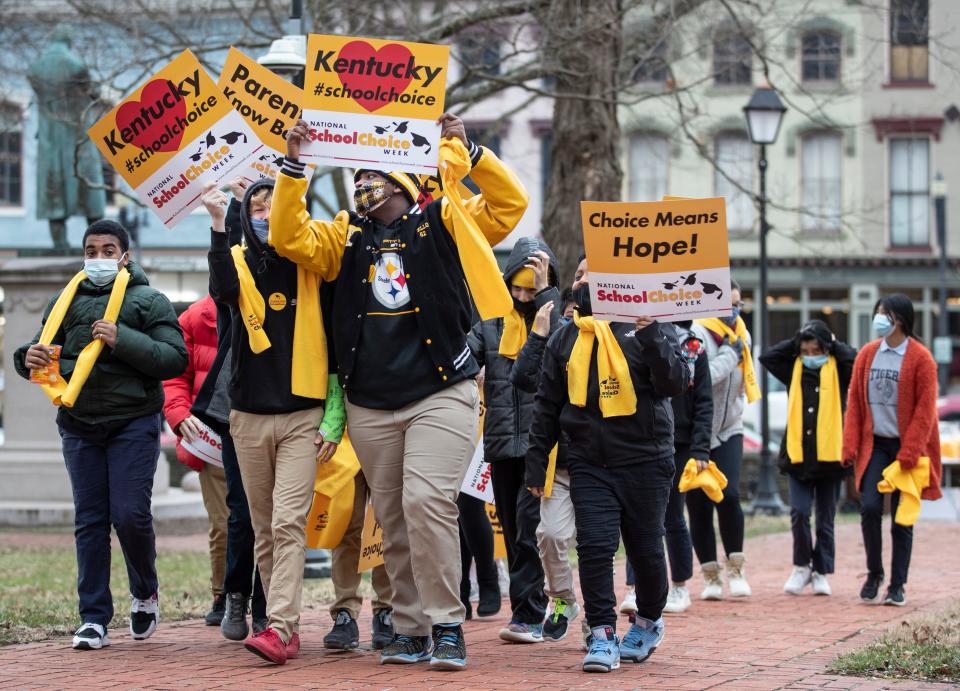Kentucky voters may get a chance to change the state constitution this fall. Here's how

FRANKFORT — Kentucky voters may get the chance to change the state constitution this November.
From voting rights to property tax changes, the General Assembly has introduced a list of proposals that could end up on the ballot.
So far, lawmakers have introduced at least 20 bills to establish constitutional amendments.
But voters won't see that many: The number of constitutional amendments allowed on any one ballot is capped at four.
Senate President Robert Stivers, R-Manchester, said collaboration between the House and Senate will ultimately decide which amendments are chosen.
“We're gonna sit down towards the end and say, ‘all right, which two do you really want, and they'll ask us which two do we really want?’” Stivers told reporters earlier this month. “But you don't want to limit your options by shutting down the process and not passing some of them.”
This session's list of constitutional amendments is a lot longer than Rep. Derrick Graham, D-Frankfort, has seen during his 20-plus years in the state legislature.
"People every session will come up with a constitutional amendment, but not like what's happening now," Graham told The Courier Journal.
To amend the constitution via the legislature, 60% of each chamber must approve the proposal. It will then be added to the ballot at the next general election that includes the state House of Representatives — in this case, November.
Voters last said ‘yes’ to an amendment in 2020, when they approved Marsy’s Law, which added certain crime victims’ rights to the constitution.
In 2022, they rejected a measure that would have eliminated the right to an abortion from the state constitution and a measure that would have allowed the General Assembly to extend the length of its legislative session.
Generally, U.S. voters are predisposed to vote against ballot measures unless they have a strong reason to vote for them, said Stephen Voss, a University of Kentucky political science professor.
That’s especially true for ballot measures that lack well-funded publicity campaigns to educate voters about what’s at stake, he said.
But, in Kentucky, the picture is a little different: Voters in the commonwealth have approved 23 constitutional amendments and rejected 13 since 1973, according to data from the National Conference of State Legislatures.
Voss believes Kentucky's cap on the number of amendments allowed per election has something to do with that. According to Ballotpedia, only three other states have a cap.
With at least 14 proposals from the House and six from the Senate, here’s a breakdown of what could appear on the ballot this year:
Voting and elections

The House and Senate have each passed proposals that would prohibit non-U.S. citizens from voting: Senate Bill 143 and House Bill 341.
Currently, Kentucky’s constitution allows citizens 18 and older who meet certain residence requirements to vote.
SB 143 passed the Senate on a 31-4 vote, and HB 341 passed the House on an 81-15 vote earlier this session.
Other proposals relating to voting and election changes include:
Senate Bill 10, which would move state elections for positions like the governor, attorney general and other constitutional officers to even-numbered years.
Senate Bill 195, which would allow convicted felons, with some exceptions, to vote starting three years after completing their prison, probation and parole terms.
House Bill 394, which establishes a Citizens Redistricting Commission consisting of 13 members randomly selected by the Secretary of State and creates a redistricting plan for the state.
House Bill 336, which creates a process where people can propose laws that they want to see on the ballot.
House Bill 566 and Senate Bill 257, which automatically restore voting rights for convicted felons upon completion of imprisonment, probation or parole.
Power changes for the legislature and governor

House Speaker David Osborne, R-Prospect, introduced House Bill 4, which would allow lawmakers to extend the regular legislative session beyond the usual constitutionally required end dates. It would also allow the legislature to call itself into special session by a joint proclamation of the Senate president and House speaker.
Currently, only the governor can call the legislature into session outside its usual meeting times. The constitution requires the legislative session to end by April 15 in even-numbered years when the session lasts 60 days, and by March 30 in odd-numbered years when the session lasts 30 days.
A similar measure, House Bill 94, would eliminate the existing dates the General Assembly must adjourn. Legislative sessions, though, would still last the same number of days.
Voters rejected a very similar proposal in 2022, also sponsored by Osborne. This year’s version has a better chance of being approved at the ballot box, Osborne said, because its text is simpler than the 2022 version, which will make it easier for voters to understand.
Kentuckians could also have the opportunity to limit the governor’s pardon powers. Under Senate Bill 126, granting pardons would be prohibited 30 days prior to a gubernatorial election and inauguration. The bill passed the Senate floor on a 32-2 vote, with one member passing.
Two other bills introduced by Louisville Democrats Rachel Roarx and Keturah Herron, HB 546 and HB 519, would lower the minimum age requirements for state legislators. Neither bill has yet been assigned to a committee.
School choice

Republicans have this year introduced proposed “school choice” amendments in response to the Kentucky Supreme Court’s recent rulings that public tax dollars cannot fund private or charter schools.
House Bill 2 would ask voters if they want to amend the constitution to allow the legislature to fund non-public schools like charter schools. While that bill has not yet been assigned to a committee, it has a good shot at advancing because it has attracted the support of key Republicans, including Osborne.
There’s also House Bill 208, which would amend the constitution to allow lawmakers to provide funding for non-public schools for families with “limited financial means.” That measure has not yet been assigned to a committee.
Both bills would prohibit the legislature from using funding from the common school fund.
Tax changes
There’s also a push to prevent property tax increases for Kentucky homeowners 65 and older.
Senate Bill 23 and House Bill 111 would freeze the property values of seniors’ homes for tax purposes. SB 23 passed the Senate on a 32-2 vote on Feb. 12, while HB 111 has yet to be assigned to a committee.
Also relating to property taxes, House Bill 62 would remove the $6,500 homestead exemption from the Kentucky constitution and let the legislature set a new amount. Meanwhile, House Bill 59 would expand the General Assembly’s powers to exempt property from taxes and allow it to eliminate all or part of state and local property taxes. Neither bill has been assigned to a committee.
Other proposals: Marijuana, slavery and clean air
Other proposals that likely won’t get the needed legislative support to appear on the ballot include:
House Bill 160, which guarantees people who are at least 21 years old the right to possess, buy, use or sell marijuana.
House Bill 295, Senate Bill 117 and Senate Bill 231 all explicitly prohibit slavery as a punishment for a crime.
House Bill 302, which establishes a constitutional right to a “healthy environment,” including clean air and water
None of the bills has yet been assigned to a committee.
Reach Rebecca Grapevine at rgrapevine@courier-journal.com or follow her on X, formerly known as Twitter, at @RebGrapevine. Reach reporter Hannah Pinski at @hpinski@courier-journal.com or follow her on X, formerly known as Twitter, at @hannahpinski.
This article originally appeared on Louisville Courier Journal: Kentucky constitution amendments may go to voters in general election

